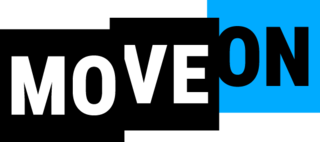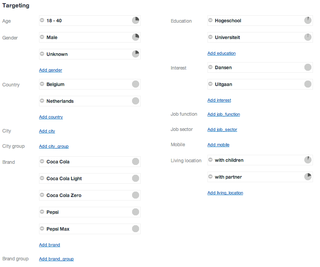Related Research Articles

MoveOn is a progressive public policy advocacy group and political action committee. Formed in 1998 around one of the first massively viral email petitions, MoveOn has since grown into one of the largest and most impactful grassroots progressive campaigning communities in the United States, with a membership of millions. MoveOn did not endorse a candidate during the 2020 presidential primary campaign; it then endorsed and actively supported Joe Biden in the general election. Rahna Epting has been Executive Director of MoveOn Civic Action and MoveOn Political Action since 2019.
Digital display advertising is online graphic advertising through banners, text, images, video, and audio. The main purpose of digital display advertising is to post company ads on third-party websites. A display ad is usually interactive, which allows brands and advertisers to engage deeper with the users. A display ad can also be a companion ad for a non-clickable video ad.

Google Ads is an online advertising platform developed by Google, where advertisers bid to display brief advertisements, service offerings, product listings, and videos to web users. It can place ads in the results of search engines like Google Search, mobile apps, videos, and on non-search websites. Services are offered under a pay-per-click (PPC) pricing model.
Online advertising, also known as online marketing, Internet advertising, digital advertising or web advertising, is a form of marketing and advertising that uses the Internet to promote products and services to audiences and platform users. Online advertising includes email marketing, search engine marketing (SEM), social media marketing, many types of display advertising, and mobile advertising. Advertisements are increasingly being delivered via automated software systems operating across multiple websites, media services and platforms, known as programmatic advertising.
Microsoft Advertising is an online advertising platform developed by Microsoft, where advertisers bid to display brief ads, service offers, product listings and videos to web users. It provides pay per click advertising on search engines Bing, Yahoo! and DuckDuckGo, as well as on other websites, mobile apps, and videos.
Microtargeting is the use of online data to tailor advertising messages to individuals, based on the identification of recipients’ personal vulnerabilities. Such tactics can be used for promoting a product or a political candidate. Direct marketing data mining techniques that are used often involve predictive market segmentation. Microtargeting's tactics rely on transmitting a tailored message to a subgroup on the basis of unique information about that subgroup.

Targeted advertising is a form of advertising, including online advertising, that is directed towards an audience with certain traits, based on the product or person the advertiser is promoting.
Social network advertising, also known as social media targeting, is a group of terms used to describe forms of online advertising and digital marketing that focus on social networking services. A significant aspect of this type of advertising is that advertisers can take advantage of users' demographic information, psychographics, and other data points to target their ads.
Adriel O. Hampton is an American entrepreneur, strategist, and political figure from California. He runs The Adriel Hampton Group, a digital advertising agency that supports progressive causes. In 2020, he co-founded New Noise Works, a video game studio. Hampton is also the founder of The Really Online Lefty League political action committee (PAC).

Cambridge Analytica Ltd. (CA), previously known as SCL USA, was a British political consulting firm that came to prominence through the Facebook–Cambridge Analytica data scandal. It was started in 2013, as a subsidiary of the private intelligence company and self-described "global election management agency" SCL Group by long-time SCL executives Nigel Oakes, Alexander Nix and Alexander Oakes, with Nix as CEO. The well-connected founders had contact with, among others, the British Conservative Party, royal family, and military. The firm maintained offices in London, New York City, and Washington, D.C. The company closed operations in 2018 in the course of the Facebook–Cambridge Analytica data scandal, although firms related to both Cambridge Analytica and its parent firm SCL still exist.

Social media played an important role in shaping the course of events surrounding the 2016 United States presidential election. It facilitated greater voter interaction with the political climate; unlike traditional media, social media gave people the ability to create, comment on, and share content related to the election.

Donald Trump, a member of the Republican Party, unsuccessfully sought reelection in the 2020 United States presidential election. He was inaugurated as president of the United States on January 20, 2017, and filed for re-election with the Federal Election Commission (FEC) on the same day.

Brad Parscale is an American digital consultant and political advisor who served as the senior adviser for data and digital operations for Donald Trump's 2020 presidential campaign. He previously served as the digital media director for Donald Trump's 2016 presidential campaign and as campaign manager for Donald Trump's 2020 presidential campaign from February 2018 to July 2020, being replaced by Bill Stepien. In September 2020, he stepped away from his company and the Trump campaign.

The Committee to Defeat the President was first established as the hybrid Stop Hillary PAC in 2013. The PAC changed its name to the Committee to Defend the President in 2017. Ted Harvey, a former Colorado state senator, chairs the committee.
Dark advertising is a type of online advertising visible only to the advert's publisher and the intended target group.
A lookalike audience is a group of social network members who are determined as sharing characteristics with another group of members. In digital advertising, it refers to a targeting tool for digital marketing, first initiated by Facebook, which helps to reach potential customers online who are likely to share similar interests and behaviors with existing customers. Since Facebook debuted this feature in 2013, additional advertising platforms have followed suit, including Google Ads, Outbrain, Taboola, LinkedIn Ads and others.
CloudCommerce, Inc., is a company based in the United States which provides digital marketing and analytics solutions. The company was traded OTC Pink as CLWD, but has since been renamed to AiAdvertising, trading as AiAd.
Opn Sesame is an American company that provides peer-to-peer political text messaging to conservative platforms.
Phunware Inc. is an American mobile software and blockchain company. It produces mobile applications for advertising and marketing purposes such as personalized ad targeting, location tracking, and cryptocurrency brand loyalty programs.
Automate Ads was an American advertising technology company that offered products for running and creating advertising campaigns on Google and Facebook. The company was founded in 2011 and was acquired by AdHawk in October 2017.
References
- ↑ Handley, Lucy (2017-10-09). "Trump's digital director was paid $1,500 for his election website. Then he raked in $94 million". CNBC. Retrieved 2017-12-02.
- ↑ Bertoni, Steven. "Exclusive Interview: How Jared Kushner Won Trump The White House". Forbes. Retrieved 2017-12-02.
- ↑ "Why the Trump Machine Is Built to Last Beyond the Election". Bloomberg.com. 2016-10-27. Retrieved 2017-12-02.
- ↑ Barajas, Michael. ""Project Alamo": Lessons From Inside Trump's SA-Based Digital Nerve Center". San Antonio Current. Archived from the original on 2020-11-09. Retrieved 2017-12-02.
- ↑ "Trump's digital ad exec based in San Antonio". San Antonio Express-News. Retrieved 2017-12-02.
- ↑ Halpern, Sue (2017-06-08). "How He Used Facebook to Win". The New York Review of Books. ISSN 0028-7504 . Retrieved 2017-12-02.
- ↑ Kreiss, Daniel (2016). Prototype Politics: Technology-Intensive Campaigning and the Data of Democracy. Oxford University Press. ISBN 9780199350247.
- ↑ "Choose your audience". Facebook Business. Retrieved 2017-12-02.
- ↑ "Showing Relevance Scores for Ads on Facebook". Facebook for Business. Retrieved 2017-12-02.
- ↑ Lambrecht, Bill (2016-11-16). "Trump's digital ad exec based in San Antonio". Houston Chronicle. Retrieved 2022-08-05.
- ↑ "This Is How Facebook Actually Won Trump the Presidency". WIRED. Retrieved 2017-12-02.
- ↑ "Mark Zuckerberg says Facebook will end untraceable political ads". The Verge. Retrieved 2017-12-05.
- ↑ "Facebook rolls out new ad policy changes ahead of Russia hearings". POLITICO. Retrieved 2017-12-05.